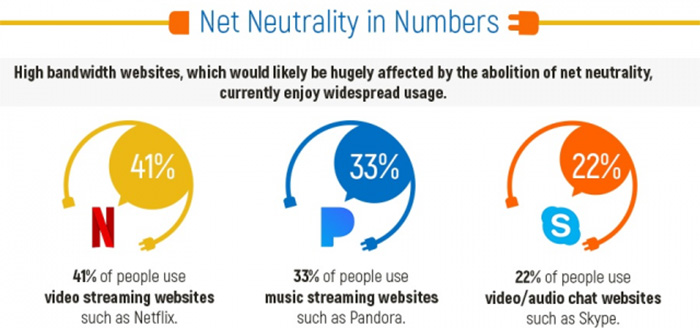
How Net Neutrality Affects Average Internet Users?
We are sure that you have been hearing a lot about Net Neutrality. Articles you can find online usually talk about how you won’t be able to use Netflix anymore or make international Skype calls. However, many of these articles forget the average Internet user. Not all of us need ultra-fast connections and not all of us stream 4K content. So, let’s see how Net neutrality affects average Internet users?
Do You Need to Care About Net Neutrality?
It is a misconception that the battle for Net neutrality affects businesses or people who watch Netflix – and no one else. This is why it’s important to understand that every single Internet user in the USA will be affected in one way or another. As you can imagine, this also applies to those who only use the Web to browse websites and check their emails.
To see how the Internet looks like without Net neutrality, take a look at an ISP called Meo, based in Portugal. As you can see, this ISP has different plans for different needs. You have to buy a subscription package to access YouTube, another for social media, and a third one for messaging. The reason why Meo decided to do this is to help its customers to cut their costs – as they say. However, you can see that customers aren’t winning here since many of them are forced to pay extra and increase their monthly costs.
How Net Neutrality Affects Average Internet Users?
At the moment, your ISP can throttle your Internet traffic. This means that some websites will take much longer to fully open. In other words, this can substantially slow down your Internet connection. This can be noticeable even if you use the Web to read the latest news. And this is exactly where we come to the first major problem.
Limited Freedom & Censorship
Today’s freedom of speech is something that is taken for granted. Even today, many countries around the world control media and influence how people feel about certain issues. However, this isn’t traditional censorship – this is a restricted flow of information.
Let’s say that your ISP decided to make it hard to access certain websites. You might be willing to wait one minute for a website for open. However, the chances are that you’ll soon switch to a fast-loading website. If this website serves the latest news on politics, this could be a new-age censorship. You won’t be able to read different sources and stay informed on your own.
Intrusion of Privacy
You might be surprised to know that ISPs can collect a lot of personal information about your browsing habits. They know which websites you like, what you search on the Web, what kinds of files you download. This isn’t a conspiracy theory – this is something that’s happening as we speak.
Without Net neutrality, it’s easy to see that this kind of control can only be tightened. By knowing that you’re monitored, you won’t be able to access information freely without worrying. This is why many are recommending using VPN applications to unlock your Web connection.
Image courtesy of FutureLab.net.
Increased Monthly Expenses
The ultimate goal of the dismissal of Net neutrality is to make you spend more. Even if you’re an average Internet user, you might want to have access to Viber, Skype, or Facebook. However, these might be in a separate subscription plan. Therefore, be prepared to hand over some money to your ISP.
Final Thoughts
It is easy to see how Net neutrality affects average Internet users. No matter what scenario you pick, there isn’t a good outcome. Therefore, fight for Net neutrality while there’s still a chance.
Let us know in the comments section below how you feel about this issue? Also, make sure to share this article with friends and spread the word about Net neutrality. Thanks!









